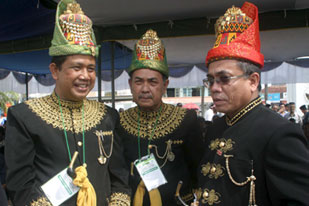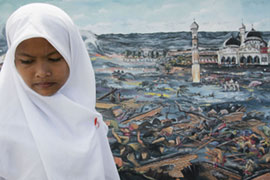Aceh vote looks to seal peace
High hopes for province’s first election after decades of war and disaster.

 |
| Candidates include former members of the pro-independence rebels |
Voters in Aceh are preparing to take part in the province’s first-ever direct elections, seen as the best hope for a permanent end to 30 years of conflict between pro-independence rebels and the Indonesian government.
The vote on Monday is a key component of an August 2005 peace accord brokered by Finnish mediators.
More than two and a half million voters will choose not only a governor for the province on Sumatra’s northern tip, but 19 local mayors.
“This is something that’s very important,” says P Ramasamy, a research fellow at the Institute of Southeast Asian Studies in Singapore. “It provides an opportunity for the Acehnese to determine the future government of Aceh.”
Candidates for the post of governor include Irwandi Yusuf, a member of the rebel Gerakan Aceh Merdeka (Free Aceh Movement, or GAM) who was involved in the peace negotiations but is now standing as an Independent.
Bitter coflict
| Aceh: Key facts |
|
Granted special territory status in 1959 GAM took up independence struggle in 1976 Among one of Indonesia’s poorest provinces Home to 100,000 Shia Muslims Introduced Sharia, or Islamic law, in 2003 Tsunami on December 26, 2004 left 170,000 dead or missing Rebels signed peace deal with Indonesian government on August 15, 2005 |
Djali Yusuf, who once led Indonesian troops in the troubled province, is also in the running. Altogether there are eight teams contesting for the top two posts.
“It’s a pretty remarkable story that such a bitter conflict can be ended with such a lack of rancour,” says Edward Aspinall, a lecturer at Australia’s University of Sydney.
GAM, also known as the Aceh Sumatra National Liberation Front, first took up arms against Indonesia in 1976, demanding independence from the sprawling archipelago.
As the military cracked down on the rebellion, GAM’s leader, Hasan di Tiro, fled to Sweden where he set up a government in exile.
It was a brutal conflict with allegations of human rights abuses levelled at both sides.
The Indonesian army was accused of rape, torture and extra-judicial killings.
About 15,000 people are thought to have died and as many as 800,000 forced to leave their homes.
Even after three decades of fighting, GAM leaders say they were prepared to continue the struggle. But the December 2004 tsunami changed everything.
‘Inhuman’
 |
| The scars left by years of fighting and natural disaster will take years to heal |
“GAM could have fought for another 30 years,” says Nur Djuli, who helped negotiate the peace agreement for the rebels.
“But with the tsunami we felt it was simply inhuman to continue fighting. There was so much suffering. The tsunami wasn’t just the trigger for the peace talks. It was the reason.”
The disaster left about 170,000 people either dead or missing. Half a million more were made homeless.
With much of the province devastated, in August 2005, just eight months after the giant waves struck, GAM and the Indonesian government signed for peace.
GAM gave up its demand for independence, while Jakarta promised the former fighters a part in the political process. Aceh itself secured a far higher level of autonomy than other parts of the archipelago.
With hopes high for achieving a lasting peace, campaigning in the run-up to Monday’s vote has been relatively trouble-free.
Monitors
 |
|
The election is a key component of the |
When polling begins on Monday, local and international monitors will oversee the voting although they are unlikely to be able to cover every one of the more than 8,000 polling stations across the province.
Although the result is likely to be known within a few days, the official announcement is not expected for at least two weeks.
In the final days of campaigning, Irwandi, the former GAM leader standing as an independent, appeared to hold a clear lead over his opponents.
To win he must secure at least 25 per cent of the vote, plus one. If not, there will be a second round of voting no more than 60 days after the first results are declared.
Whoever eventually wins will have to meet campaign promises while ensuring the law governing Aceh is properly implemented and honoured by politicians in Jakarta.
Decades of war and the tsunami have devastated Aceh’s economy, which is rich in natural resources such as oil, gas and coffee.
‘Massive task’
 |
|
Two years after the devastating tsunami, |
Kuntoro Mangkusubroto, the director of the agency co-ordinating reconstruction, is in no doubt about the enormity of the challenge facing the authorities.
“We are constantly overwhelmed by the massive task confronting us,” he told donors in New York at the end of last month.
Now the four million or so people who live in Aceh want what most people want – jobs, good schools and hospitals.
Nearly two years after their homes were swept away in the tsunami, many thousands still need a proper roof over their heads.
“Most of us have been through a very traumatic period,” says Saifuddin Bantasyam, who teaches law and sociology at the University of Syiah Kuala in Bandar Aceh, the provincial capital
“Expectations for a change in that situation are high.”